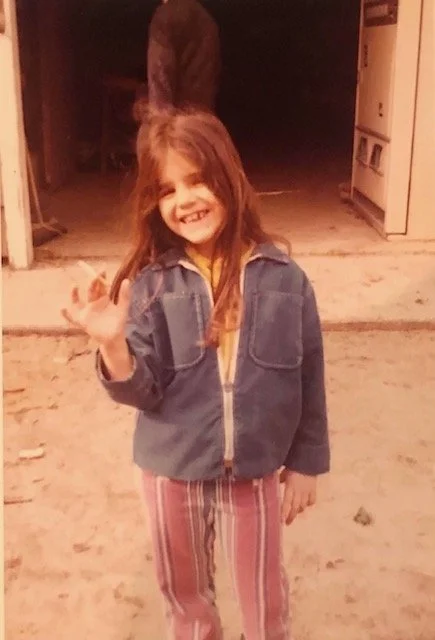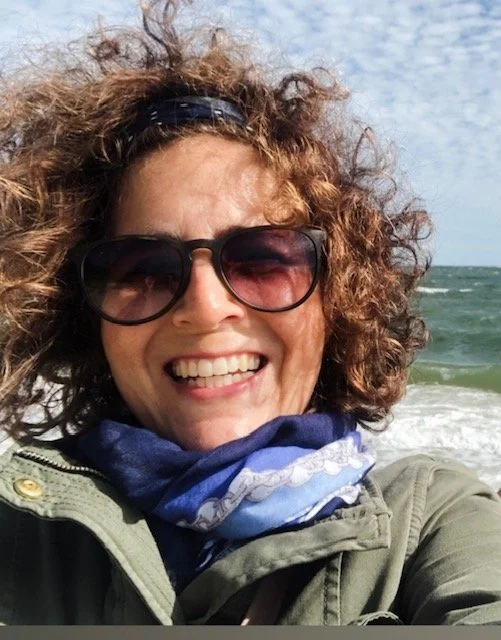“Marlboro Man” by Leslie Lisbona
My father loved unusual cars. We couldn’t afford to own more than one at a time, so whatever he chose was our only car. My older brother and sister shared it with my parents until my father decided he wanted something different.
When I was five years old, we took the bumblebee yellow Carmen Gia to Jones Beach, its top down, my curly hair whipped by the wind. At nine, I watched as people stared at us in our mustard-colored, jeep-like convertible called The Thing. In the sixth grade, my father dropped me off in the mornings in the shiny silver Scirocco. When I was in high school, it was in the emerald-green Fiat convertible, a two-seater with a miniscule bench in the back. This car is probably where I developed my claustrophobia. After I graduated from college, my father drove a black Suzuki, depositing me on Park and 40th for my first job. That car felt like riding a crazy horse; I had to keep my eye on the road for bumps and brace myself.
On Saturdays when I was 11, 12, and 13, my father drove me in our steel-grey Mazda to ballet school on 65th and Broadway before going to work in his shop on Madison Avenue. This car was narrow enough for me to unlock my dad’s door with barely stretching my arm from the passenger seat. Apparently, the car was a big deal because it was the first model in the US that had a rotary engine. During these rides, I can only remember it being cold outside, the sky a cement grey.
We were used to spending our mornings cramped together, in bucket seats only inches apart, as he maneuvered the car with dexterity in and out of rush hour traffic. We listened to 1010 WINS, with its frenetic teletype backdrop, traffic and AccuWeather on a loop, and its regularly repeated declaration: “You give us 22 minutes, we’ll give you the world.” I think it comforted him. I didn’t dare change the station.
My dad wouldn’t let me roll down the window because he was always cold. He dreaded the winter and never seemed to remove his jacket. In a photo I have of him as a child, he is standing alongside family and friends on what seems to be a hot summer day. Everyone is dressed in light clothing except my father. He is wearing a winter coat. The photo makes sense if you knew him.
I could have lived without opening the car window if he didn’t smoke, but he did, and not just cigarettes but a pipe as well, and sometimes a cigar. In our tight quarters, he managed to light a cigarette, place his pipe somewhere, and drive a stick shift.
“Dad, can I roll the window down just a crack?” I said tentatively. “I can’t breathe.”
“It’s freezing outside. I got you an air freshener. Look,” he said, jabbing at it, making its menthol wintergreen sway before me.
“I’m going to be sick,” I moaned.
“I’ll put on the air conditioner for a few minutes,” he said.
The radio announced: “The newswatch never stops.”
He shouted at other drivers who were imbeciles, his word. If someone was too slow, he’d say, “Look at this guy. He died behind the wheel.” If someone braked at yellow lights, he’d say, “How come all the Sunday drivers are out today?” Mostly though, he cursed in Arabic, saying “kusumec” or “charmuta,”with articulation and emotion. When he was really frustrated, he would say “alaydeblake” and top it off with “oolie,” drawing out the last syllable for a full city block.
He drove with ferocity, as if the road were a war zone. He shifted gears and fought with the steering wheel, cursing in two languages, the smoke filling the small space around us.
I looked over at him.
He was so well dressed. Even when he wore jeans, they were an expensive designer brand. He wore a starched white button-down shirt with a tie. Sometimes he chose an ascot. His shoes were buttery leather, Italian made. His winter coat was long and blue. He was slim, with a bit of a belly that he was never happy about. He kept his hair short, and he was always clean shaven. I loved his pipe tobacco pouch: the fruity smell, the leather soft to the touch, like a dog’s floppy ear. Sometimes I would bury my nose in it to get away from the cigarette smoke.
I gazed out onto the river as we crossed the 59th Street Bridge and hoped that Madam Zorina would tell me that it was time to buy point shoes. I wondered if three pirouettes were even possible for me.
“Can I get a new leotard?” I said, turning toward him.
“Sure,” he said, peering ahead as he sucked on a cigarette. He patted his chest pocket to make sure his lighter was there, like a security blanket.
He pulled up to my school on Broadway. “Come straight to my store after class,” he said, “and I’ll get you lunch.”
“Okay, Dad,” I said as I gathered my bag.
“Don’t stop and talk to anyone,” he said.
“I won’t.”
I smiled at him.
“Walk on Central Park South all the way to Madison and then make a right,” he said, eying me over his glasses.
“Okay, Dad.”
I swung my legs onto the pavement and hoisted myself up.
“Should I get you an egg sandwich or a bagel with cream cheese?”
“Both,” I said, and I laughed.
“Okay, Yella, go. Let me see you get into the elevator.”
I slammed the car door shut. I was reeking of smoke, feeling green and wobbly, my hair in a tight bun, my tights and leotard under my jeans and sweater. The elevator man who wore a woolen hat waved me in and nodded to my dad.
Only then did my dad peel away from the curb at lightning speed. The elevator man raised his eyebrows, and I tried not to roll my eyes. I grinned instead and said, “Good morning.”
Artist Statement
Marlboro cigarettes had billboard ads all over NYC when I was a kid. It was always a photo of a rugged man, usually a cowboy looking off into the distance. Sometimes the man had a mustache but he was always handsome and strong. He looked heroic, mythological. In my essay, “Marlboro Man” I saw my father that way as I sat next to him in his car. He smoked while navigating the wild terrain of the 59th Street Bridge and midtown Manhattan. I was his daily passenger. It was the only time I got to spend with him, one on one, without the presence of my siblings or even my mother.
I take my inspiration from writers and memoirists such as Kiese Laymon who is so vulnerable and authentic in his writing. I recently had the privilege of meeting him at one of his readings. My hope is that I can continue to peel away to the heart of any story.
Leslie Lisbona was featured in the Style section of The New York Times in March 2024. She has been published in JMWW, Smoky Blue Literary & Arts Magazine, and Welter. Her work has been nominated for Sundress Publications' Best of the Net 2024 contest and won the nonfiction prize at Bar Bar Magazine (2024 BarBe Award). She is the child of immigrants from Beirut, Lebanon, and grew up in Queens, NY.


